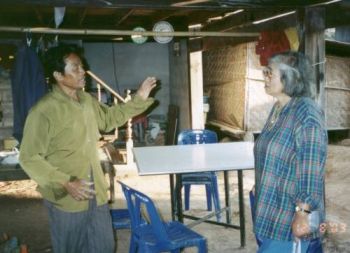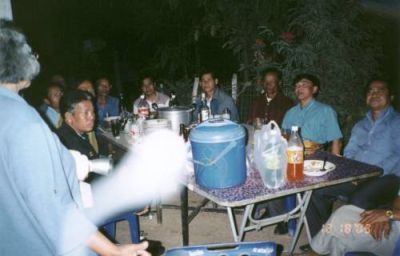Steve and Jemjahn go to Thailand, 2003
5. Jem's Old Home in the Village
10. Impressions of the Village
22. Thai People, My Impressions
17. Jemjahn and the Village Headman
I’ve long known how lucky I am having this remarkable woman as my partner through life. I couldn't possibly list all her virtues, but enough to say she’s friendly, cheerful, funny, sassy, scrappy, generous, lusty, gregarious, strong, salt-of-the-earth, self-confident, self-indulgent, hard-working … but better I stop. Enough to say she’s a wonderful wife, the best mother our young children could have had, and a truly good person.
What I didn’t know was that even after 32 years in America, she was still at home in the village, and how much she was liked and respected there.
I’d see it on our walks, when villagers would stop us to chat with her. I saw it at the village elementary school, when the teachers and principle talked with Jem for a half-hour until they needed to shepherd the children into class. I saw it in the half-dozen educator relatives (ie, high social status) who came to the house to speak with her. I saw it the afternoon Gordon, Pu, Jem and I went for a walk and a pickup truck passed us, then skidded to a quick stop on the dusty road, and a man jumped out, a distant cousin, who hadn’t seen Jem in years, but recognized her while passing us.
But I most clearly saw the affection and respect the evening we went to the village headman’s house.
Jem wanted to talk with him about two things. One was the damage being done to the dirt road near Loy’s house by large trucks carrying loads of sand dredged from the river. The second, that we were going to evict her brute of a brother, Jooap, and that mayhem might result.
It was after dinner and dark already when Jem, her sister Sangjahn and I walked to the village headman’s house. We found him across the street, sitting at an outdoor table with about ten men. One man was the head of the ampur (similar to our county), the ampur headman’s assistant, and others from the city of Chakarat. It was a meeting of the local area’s leaders.
I was thinking we should come back to talk with the village headman another day, when I see Jem walk right to the men's table, introduce herself, and ask the village headman if they could talk for a few minutes.
An
interruption like this might be unusual, even rude, in America. In
Thailand, where from birth all - but especially poor rural folk - are
made conscious of their position in the social pecking
 order,
this interruption was remarkable. Even more remarkable was that the
village headman smiled, stood up from his chair and cheerfully walked
with Jem across the street to his house. I joined them under his home’s
balcony. Sangjahn, not as confident of herself, stayed back on the
street, waiting in the dark.
order,
this interruption was remarkable. Even more remarkable was that the
village headman smiled, stood up from his chair and cheerfully walked
with Jem across the street to his house. I joined them under his home’s
balcony. Sangjahn, not as confident of herself, stayed back on the
street, waiting in the dark.
Later I found this wasn’t exactly a meeting of strangers. As a girl, Jem had been friends with his parents, and she remembered the headman when he was just a boy tending his water buffaloes. Now as headman, he was attentive to her concerns, and I could see why, even with my limited Thai, he was the village headman. A good listener and a good speaker.
After talking fifteen minutes about Jem’s two concerns, they stood up. He to return to his meeting, Jem, I thought, to come home with me.
But no, she went across the street with the village headman and began talking with the men at the table.
Now I stood in the dark street with Sangjahn. We were a little too far away to make out what Jem and the men were saying, but their smiles and laughter told me they were fully enjoying her presence.
After
about ten minutes, I thought it better for Jem to leave before she’d
worn out her welcome. I crossed the street and went to her side, then
made a joke (in Thai) about it being dark and time for us to be getting
home.

Except for the village headman, it was the first the men at the table had known I was there, and I could sense some surprise when they saw me for the first time.
By now, though, Jem was fully center-stage. She told the men this was her husband of the past 35 years, that I was still in the US Army, and yahng roobloh dooey (still handsome, too), which got her another easy laugh.
She didn’t seem to want to leave, enjoying the once-poor-villager-speaking-as-equal scenario with the county’s leaders. I almost had to take her by the elbow to get her out of there.
After all these years, I thought I knew this woman. That night I realized I knew her only in an American context, not in her own element, where her strengths are even more pronounced. Gordon said, after our hours walking through the village and being stopped often by villagers to chat, that if Jem stayed and lived there, the villagers would make her headman. If he had seen her this night, he’d have said they’d make her Queen.
This woman who is challenged by technology ... this woman who woke me a few nights earlier to take her to the bathroom downstairs because she was afraid of spirits, especially her mother’s ... this woman who is so dyslexic with numbers she can’t multiply 3 x 4 … this woman can talk easily with everyone from a peasant to a president.
next: Phimai